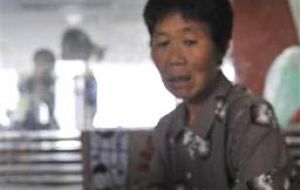MercoPress. South Atlantic News Agency
Contaminated milk poisons thousands of Chinese toddlers
 Fonterra knew of contaminated milk in August
Fonterra knew of contaminated milk in August More than 6.200 babies have fallen ill after drinking milk made from contaminated powder, Chinese Health Minister Chen Zhu announced. The figure is five times higher than previously announced.
The outbreak first involved a company 40% owned by a New Zealand company. Mr Chen said a third baby had now died - with the latest fatality occurring in the Zhejiang province of eastern China. Chinese state television reported that the chemical melamine had been found in 22 brands of powder, not one as previously thought. Mr Chen said a total of 6,244 infants were now sick, and that the number of those diagnosed with "acute kidney failure" had risen to 158. The government has called the poisonings a "Level 1" food safety incident and formed an emergency team to grapple with the fallout, Xinhua news agency reported. But rising public anger, expressed on China's active internet forums, is prompting reports of a crackdown by the government on reporting of the milk scandal. That anger was reflected outside the headquarters of the company blamed for making the contaminated formula, Sanlu Group, in Shijiazhuang, Hebei province. Sanlu has apologised, saying that suppliers who sold the milk had apparently added the chemical. Normally used in the manufacture of plastics, melamine makes foods appear higher in protein, but has caused kidney stones in babies in several Chinese provinces. News emerged of the problem only after a New Zealand company, Fonterra, which owns 43% of Sanlu, informed New Zealand Prime Minister Helen Clark, who then informed the Beijing government. Four people have so far been arrested in connection with the scandal, with more expected. Twenty-two others are being questioned. Vice-health minister Ma Shaowei warned on Monday that as many as 10,000 infants may have drunk the contaminated milk. China has a reputation of unreliable safety controls which in the last two years have included not only baby milk, but toothpaste, toys, tires, pharmaceutical generics, canned food. Furthermore it has been reported that over half of China's water resources are contaminated as well as a significant percentage of farmland, according to Western standards.




Top Comments
Disclaimer & comment rulesCommenting for this story is now closed.
If you have a Facebook account, become a fan and comment on our Facebook Page!